How LGBTQ soldiers, doctors, and volunteers protect Ukraine
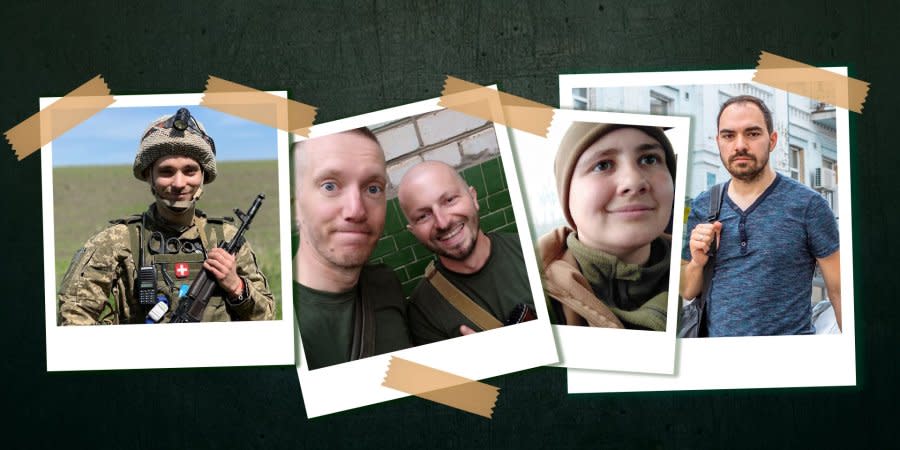
Combat medic
"At the beginning of the war, I knew that there would be a lot of casualties,” says 23-year-old Oleksandr, a senior combat medic and a junior sergeant in the Ukrainian army.
“Considering that I have zero military knowledge, I understood that I would be useful in medical activities.”
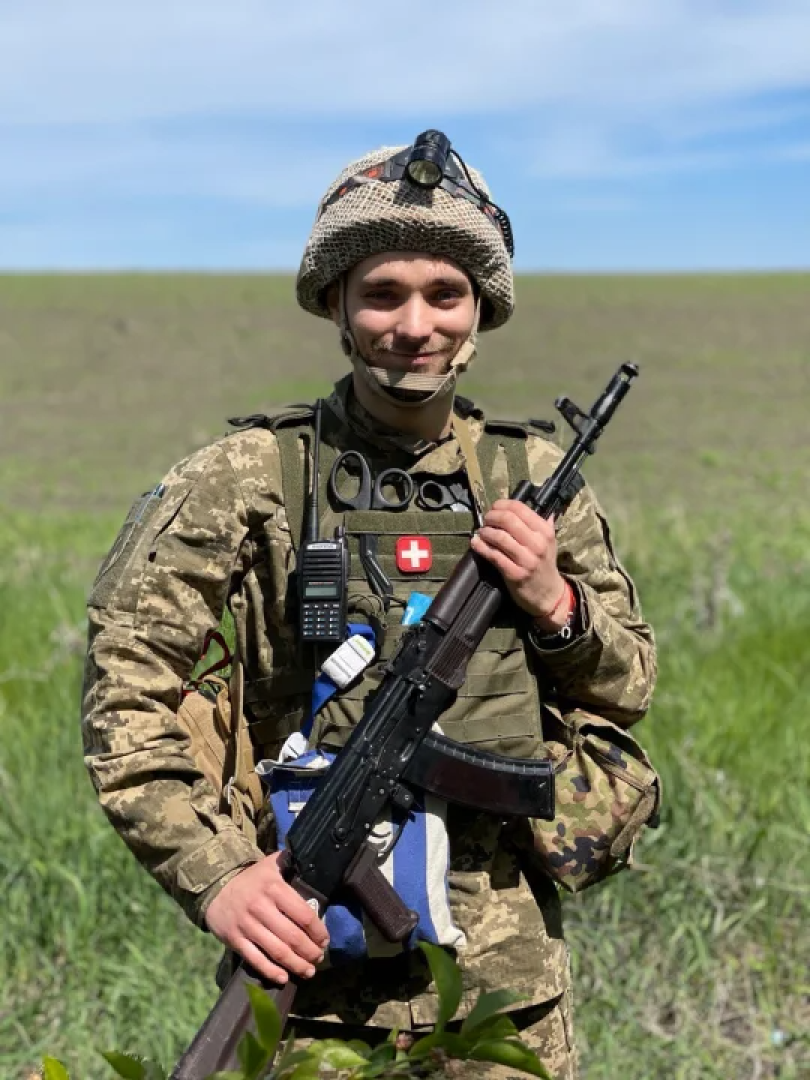
Oleksandr graduated from college with a degree in nursing, and is currently in his fifth year of medical school, studying Pediatrics. Thanks to the knowledge gained in college, he is well versed in field medicine and emergency care.
On March 10, he was called up to the Ukrainian Armed Forces as a medic, the next day he went to the military unit where he is now.
“Somewhere between March 24 and April 4, we were in the city of Irpin, where we were at ground zero. There were no serious injuries from my company at that time – only a concussion from the explosions.
Then, before our departure, another brigade passed through my company,” recalls Oleksandr in a conversation with NV.
“A tank hit them, so about 10 people were “two hundred” (a term from Soviet times referring to battlefield fatalities), and only four were wounded. Together with my partner, I helped them.”
Later, on May 20, his partner was also badly wounded.
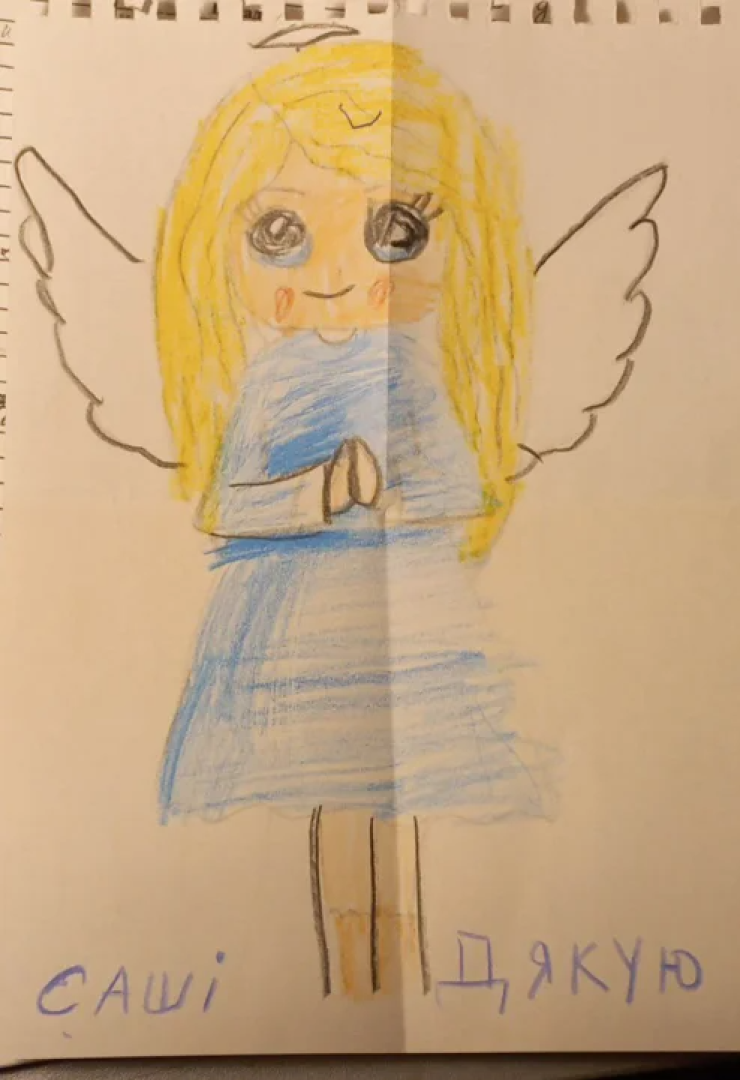
After the enemy retreated from Kyiv Oblast, the brigade in which Oleksandr was serving returned to Kyiv for a while. But soon, on April 12, they were sent to Kharkiv. At the time this interview was conducted, Oleksandr was stationed in Kharkiv Oblast, at a border position where the fighting is some of the fiercest.
“On the day when I was preparing answers to your questions, the parallel company was (hit by artillery), and I had to help in the evacuation of the wounded and dead,” Oleksandr says.
“Five people were killed, eight were wounded.”
The next morning was also a busy one for him: the neighboring company was also hit by enemy artillery, as a result of which four soldiers were killed and nine wounded.
“Compared to Russia, Ukraine is more tolerant of LGBT people,” Oleksandr says of the attitude of those around him to LGBT people.
Read also: Ukrainian servicewoman shares story of battle, loss, and resilience
“And, in my opinion, the support of the LGBT community is more developed here. You know, cavemen used to be afraid of fire too. And then they realized that this is just natural.”
He first came out as gay to a female friend in 2021 – he calls her a girl with “conservative principles.”
He admits that he didn't want to talk about it for a long time, but plucked up the courage in the end. In fact, she had guessed about his sexuality a long time ago having picked up hints, of it, Oleksandr says.
Currently, only one of his siblings knows about his sexual orientation – that sibling himself is bisexual.
According to Oleksandr, the more publicity there is about LGBT people in Ukraine, the better: “Then people will understand that we are among them. And there are a lot of us.”
According to his observations, the general level of homophobia in Ukraine has decreased over the past few years. But there are still some “strange experts” who have not changed their views.
Read also: Over 7,000 Ukrainian soldiers thought to be missing since Russia’s full-scale invasion
Oleksandr emphasizes the fact that LGBT people have always existed everywhere, and among them are Ukrainian and world celebrities, and historical figures.
“LGBT people are no different from you,” he says. “Some heal you, some protect you. Some raise and are teaching your children. And that doesn't make them different. So now is the time to think about that, if you haven’t already.”
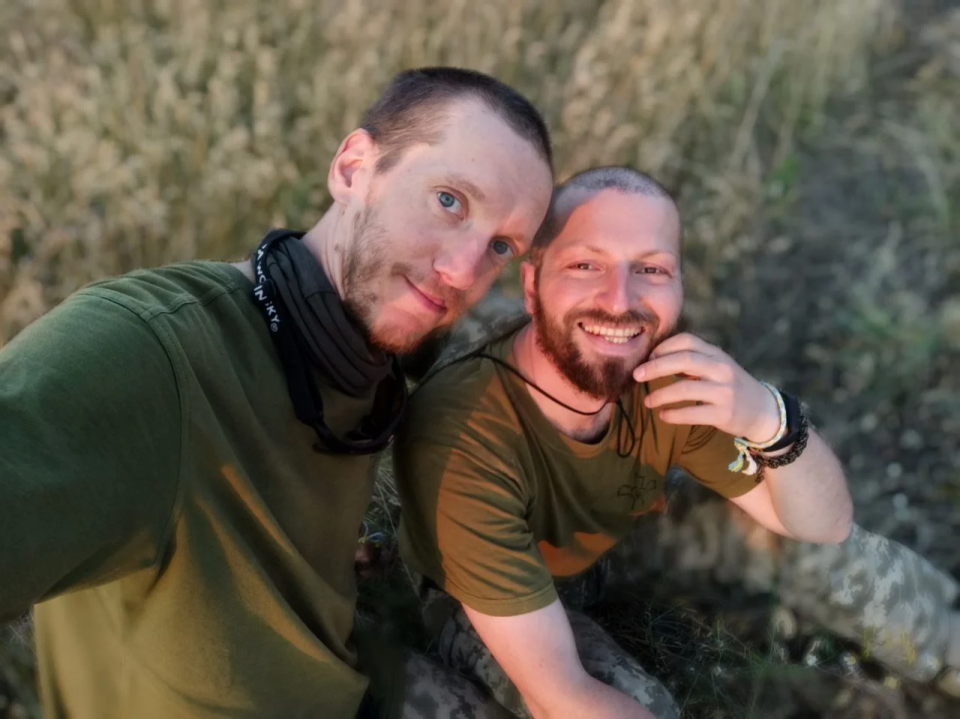
Queer military couple
Director and performer Antonina Romanova from Kyiv is a non-binary person, meaning that she does not identify as either male or female. Usually, such people choose the pronoun "they/them" instead of “he” or “she.” But they can also choose a pronoun that is the opposite of what gender they look like, Antonina says.
“I generally look masculine, but I chose the pronoun ‘she’ for myself. My husband Sashko (Ukrainian short form of the name Oleksandr) and I belong to the LGBT community. We are gay.”
On Feb. 24, the first day of the full-scale invasion, there was a big request for donated blood in Kyiv, Antonina recalls, so she went and donated hers. She and her husband Oleksandr Zhuhan spent the first night of the full-scale war with Russia in the bathroom, then went down to the bomb shelter.
They thought about it and realized that they had three options: either to hide in a bomb shelter, to run away, or to go defend the country with weapons in hand.
"We chose the third option and I don't regret it. Already on the second day, Feb. 25, Sashko and I went to join the Territorial Defense Forces.”
Read also: Frontline medic on her work in the very crucible of war
Everything happened very quickly," recalls Antonina. In life, she is a director and performer. Now, in the war, her call sign is Crimea. Together with Oleksandr, also a theater actor, they serve in Mykolaiv Oblast.
“Before this, neither I nor Sashko had had anything to do with the army at all,” Antonina tells NV.
“Until these days, I had never held a Kalashnikov assault rifle in my hands and never fired a shot – I learned everything on the spot, just like Sashko. Everything has to be learned at some point, although I can’t say that I’ve always dreamed about it, it’s not as scary as it seemed at the beginning.”
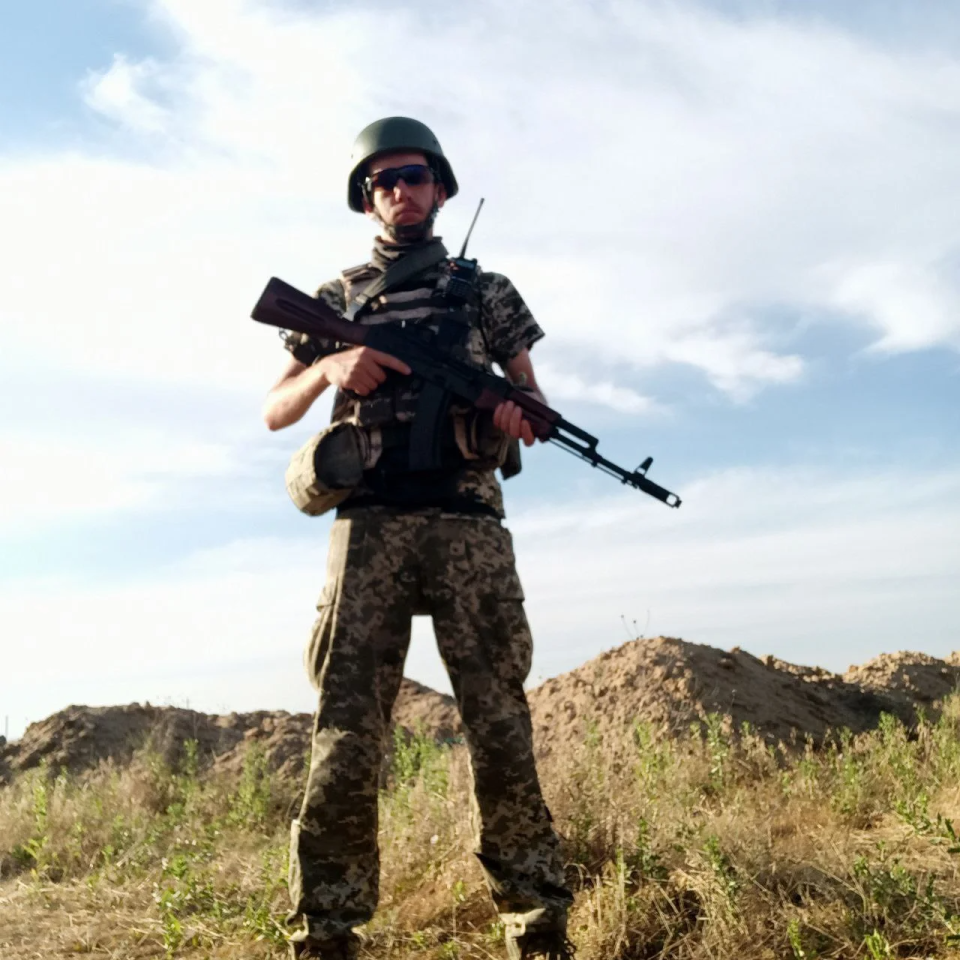
“I would like to say that after the victory I will happily forget all this. But as long as the Russian Federation exists, we need to keep our machine guns clean.”
Antonina first came out before 2014. She had no problems with it then, she recalls:
“People look at Sashko’s and my social network accounts – everything is as transparent as possible there. I was prepared for some problems or bullying, but I was pleasantly surprised. There was nothing like that.”
It was scariest for the first Ukrainian LGBT soldiers to come out, says Antonina, referring to Victor Pylypenko, a grenadier in the Donbas Battalion, and Nastya Konfederat, a volunteer and scout.
Antonina calls them real heroes and adds that the stories of these two people had a great impact on her personally.
Now the LGBT military has its own group on social networks, where allies can also join. They also communicate with each other in a closed chat for gay military men.
“The guys are opening up bit by bit – everything is good. It's not scary, so I encourage LGBT people to come out. This is very important,” says Antonina. She says that after the full-scale invasion by Russia, even more, Ukrainian men and women went to defend Ukraine. Accordingly, because of this, the number of LGBT people who stood up to defend the country also seems to be larger.
Some who joined the army had already come out as gay – like her and Oleksandr. Others came out after they had joined up. Now Antonina admits that she sees fellow soldiers coming out as LGBT people almost every week.
One of the key problems for LGBT people in Ukraine today is the lack of legal mechanisms that allow same-sex couples to legally formalize relationships.
This issue is especially acute during the war when the problems of registration of inheritance, social protection, and other issues are more relevant than ever.
“If one of us is injured, the doctors would let only close relatives or a husband or wife into the ward,” says Antonina. “We do not belong to either the first or the second category. In my opinion, this is very unfair. We don’t just want to protect our mother Ukraine, we also want her to protect us – and our rights in particular.”
According to Antonina, a law on same-sex marriages or on civil partnerships should have been adopted long ago. After all, for some LGBT soldiers who have died for Ukraine, it’s already too late.
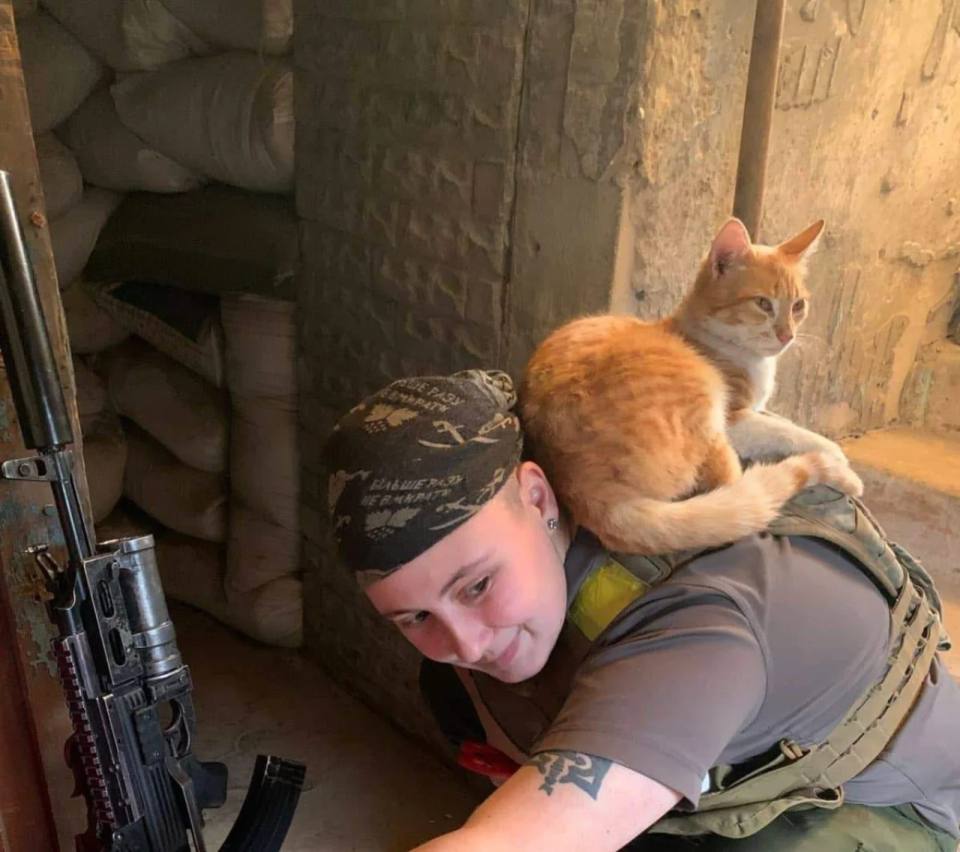
Scout
"(I’m a) cleaner. (I’m a) freelance doctor in the role of a scout. And I can shoot with everything," says combat medic Margo, nicknamed Dyka (Wild in Ukrainian).
She went to defend the country seven years ago as part of a volunteer battalion. Her motivation was a sense of civic and national duty – at that time there were no thoughts about money or career growth, she tells NV.
After some time, under circumstances beyond their control, everyone had to sign contracts with the brigade with which they were cooperating at that time.
“The first steps at that time for me were the study of various weapons,” Margo says. “In the first days of the war – only in theory, and later – already in practice.”
“But not everyone took these aspirations of mine for granted. Most of the fighters were a rather conservative contingent – they believed that a woman had no place in war, and said things about ‘a truly feminine purpose,’” she says.
She found this annoying and interpreted it as an infringement of her rights.
Read also: Ex-MP describes what it's like to be a medic on the front lines
Margo first went to the front in 2016. At that time, she could already use a Kalashnikov assault rifle, an RPK machine gun, and a rocket-propelled grenade launcher, and was also able to provide first aid.
But in spite of this, for a long time, she still had to prove to the more experienced fighters of the unit that she was physically, morally and psychologically capable and worthy of joining their ranks.
“I went to the postings on an equal footing with the others, and got involved in various household chores. And I won over many, I’m sure. The time spent with a virtually all-male team in a trench warfare environment contributed to that.”
The fact that she is a lesbian is known to all of her comrades, among whom there are also many other LGBT people. In general, she says, her colleagues are fine with this – but there are exceptions:
“There are a couple of mentally unstable elements ‘who threaten to shoot all of them,’” she says.
“But no one pays attention to them.”
Margot calls herself a family person: she has a girlfriend and treats her son as her own. She says she is grateful to her lover for entrusting her with the upbringing of her child, but she misses them both very much. They have not seen each other for more than six months.
From November 2021 until today, Margo has been serving on the Donetsk front. At dawn on Feb. 24 – the start of Russia’s full-scale invasion of Ukraine – she had just started her shift at a combat post. She says the war going on now is not only a war to control territory, but also a war of values.
The material was created with the support of the project "Promoting Social Cohesion in Ukraine / Item 7", which is implemented by the American Bar Association's Rule of Law Initiative (ABA ROLI). The information presented may not reflect the views of ABA ROLI.
Read the original article on The New Voice of Ukraine

